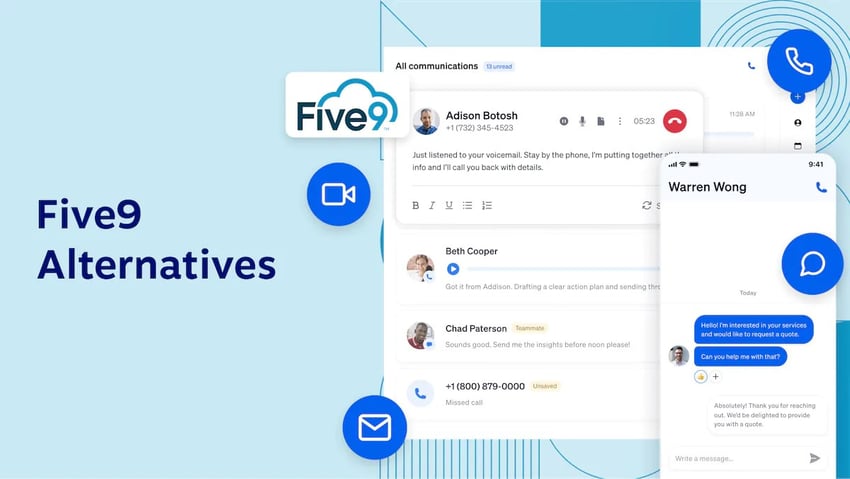What Is a Hosted Phone System?
A hosted phone system, also known as a cloud phone system, is a business phone setup that operates over an internet connection and is managed off-site in the cloud by a third-party provider. Unlike traditional phone systems that require on-site servers and equipment, the provider takes care of all the hardware, software, and network infrastructure, leaving you free to worry about it all. This, in turn, reduces your business’ maintenance and equipment expenses.
Hosted phone systems are provided to you as a service, usually on a subscription basis, with predictable and manageable operating costs. They offer not only cost savings but also flexibility and a rich feature set that traditional systems struggle to match. From advanced call routing to integration with other business applications, a hosted phone service provides you with the best possible foundation for better communications.
How Does a Hosted Phone System Work?
A hosted phone system uses Voice over Internet Protocol (VoIP) instead of physical copper wires and works through a cloud-based PBX, which acts as a virtual switchboard for your calls. Here’s a simplified breakdown of the process:
- Choose a provider: Select a reputable hosted phone service provider that meets your business needs.
- Connect to the cloud: Your provider will connect your business to their data centers via an internet connection.
- Incoming calls: An incoming call reaches the cloud-based PBX.
- Call routing: The PBX intelligently routes the call based on pre-set rules, such as auto attendants or call forwarding.
- Outgoing calls: You can make outbound calls using a variety of devices, including traditional desk phones, mobile apps, or even your computer.
Important Note: The entire system relies on a strong internet connection. High-quality calls require a minimum bandwidth of 100 kbps upload and download speed per line.
The beauty of a cloud phone system lies in its flexibility. With a hosted VoIP solution, any device with an internet connection can become a business phone. You can make and receive calls using your mobile phone, laptop, desktop computer, or even a traditional landline integrated with your system. Your workforce stays connected and mobile, no matter their location.
What is the difference between VoIP and hosted?
VoIP is a method for making calls over the Internet, while “hosted” refers to a service where a provider manages the VoIP system in the cloud, eliminating the need to buy and maintain your own equipment. So, VoIP is the engine, and hosted is like renting a car with that engine already installed — you just use it without worrying about the technical side.
Types of Hosted Phone Systems
There are two main types of hosted phone systems: cloud PBX and SIP trunking.
1. Cloud-hosted phone system
A cloud phone system eliminates the need for on-site phone equipment. Instead, all your phones connect directly to a VoIP data center operated by your service provider. Each phone is configured with a unique login and programmed to register with a SIP server beforehand. SIP (Session Initiation Protocol) is the technology that allows voice calls to be made over the Internet.
Cloud-hosted systems offer a wide range of communication features essential for today’s business owners, including voicemail to email, auto attendants, and video conferencing. From a management perspective, cloud-hosted private branch exchange (PBX) is the easiest to use, as the provider handles all the maintenance and updates.
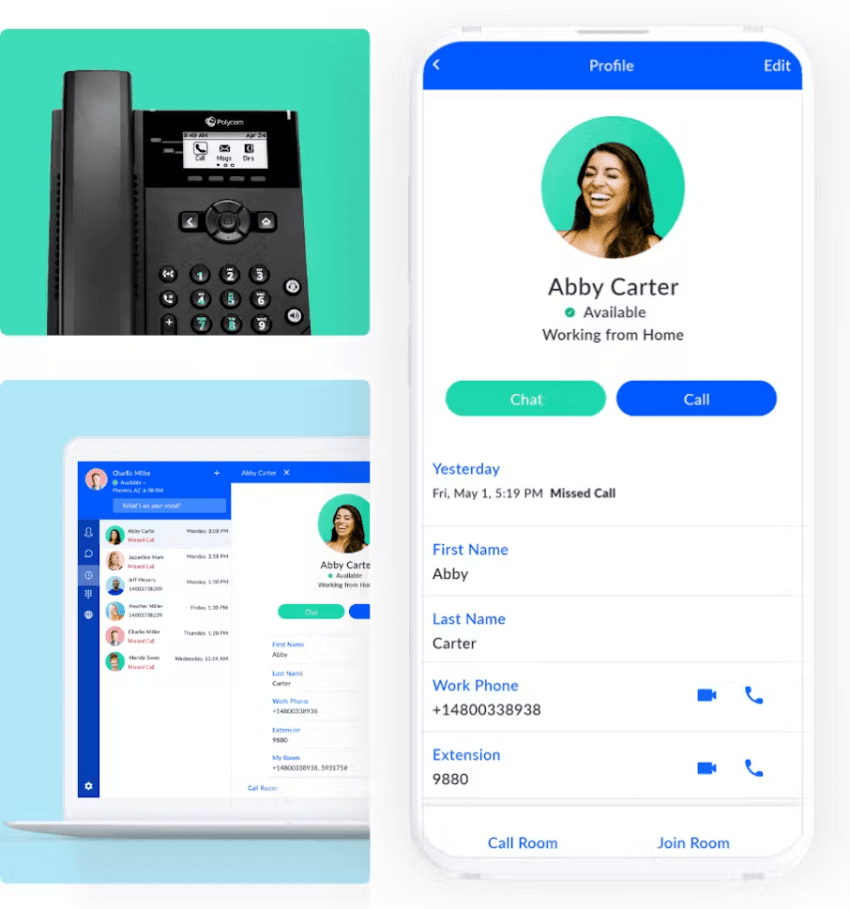
2. SIP trunking
SIP trunking is ideal if you already have an on-premise PBX system (a physical phone switchboard) that you’d like to keep.
SIP trunking replaces your traditional phone lines with virtual ones delivered via the internet through a SIP trunk provider. This allows you to make and receive calls just like with an analog system, but with the cost-effectiveness and flexibility of VoIP technology.
SIP trunking also provides an added layer of redundancy. In the event of an issue with your PBX, your calls can be automatically routed to any designated location, such as a physical backup office or a virtual receptionist service. Apart from the initial setup costs for compatible handsets, modems, routers, and switches, there’s no need to allocate additional capital for your hosted phone system.
Oh, it gets better. Hosted phone systems include traditional PBX and VoIP phone systems. If you already have an IP PBX, SIP trunking transitions your existing PBX setup into an internet-powered telephone network.
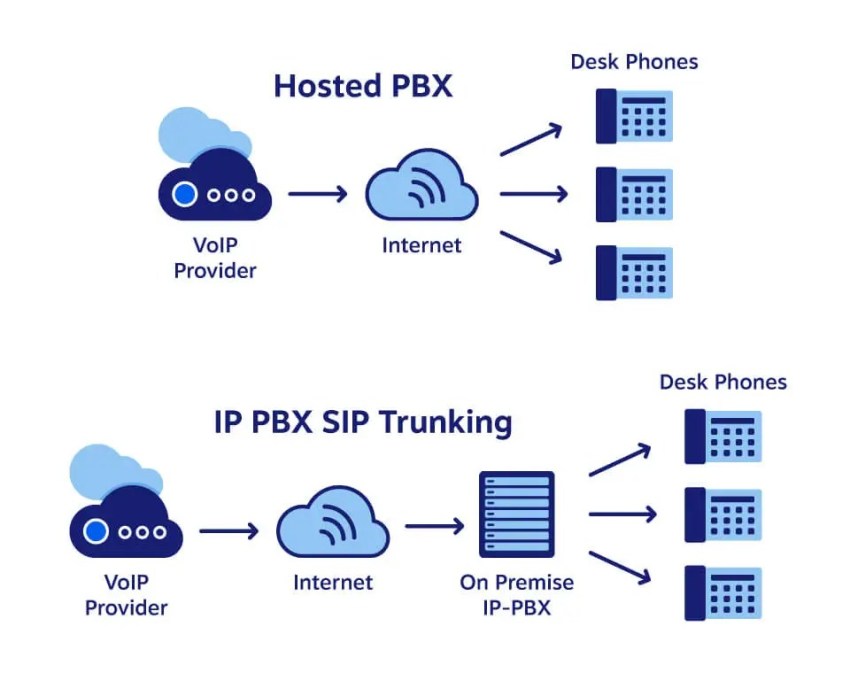
What is the difference between a Cloud PBX and SIP Trunking?
A cloud-hosted PBX system is a complete overhaul of traditional telephony equipment, with a system entirely hosted by a service provider. Businesses get advanced telephony features with minimal upfront costs and easy management. However, it requires new compatible phones and internet equipment.
SIP trunking, on the other hand, integrates with your existing PBX system and is ideal if you already have a functional PBX and want to upgrade to VoIP without replacing everything. SIP trunking boasts lower ongoing costs and potential redundancy options, but it requires a compatible PBX system, offers fewer features, and relies on your internal IT team for maintenance.
The best choice depends on whether you want a feature-rich, completely new system or a cost-effective upgrade to your existing setup.
| Feature | Cloud-Hosted PBX | SIP Trunking |
|---|---|---|
| Existing Phone System | Not required | Required (PBX needed) |
| Upfront Costs | Lower | Higher (requires PBX upgrade) |
| Scalability | Highly scalable | Less scalable (limited by PBX) |
| Features | More features (call recording, call forwarding, voicemail, CRM integrations, and more) | Fewer features |
| Maintenance | Provider manages the infrastructure | Requires internal IT support |

Who Can Benefit from a Hosted Phone System?
Here are some key reasons why a hosted phone service might be the perfect fit for your business:
- Remote teams: With features like mobile apps and web interfaces, employees can work seamlessly from anywhere with an internet connection.
- Small businesses & startups: Hosted telephone systems offer a scalable and cost-effective alternative to traditional phone services, eliminating the need for expensive hardware and complex installations.
- Businesses on the move: You stay connected with features like call forwarding and voicemail to email, and never miss an important call.
6 Advantages of a Hosted Phone System
Here are some key benefits of having a cloud-based phone system that a traditional setup can’t offer:
1. Easy installation
The setup process of a traditional phone system can be long, complex, and expensive. But a hosted phone system doesn’t have any of those problems.
Setting up a cloud-based system online means you don’t need anyone to come to your office to get started. That makes it cheaper, too, which is great for small businesses or those with remote teams.
2. Cost savings
Hosted phone systems are cheaper than their traditional alternatives for two reasons. The first: you don’t need to buy a new haul of equipment.
With a cloud phone system, you can use the equipment you’ve already got. That includes:
- Softphones
- Desk phones
- Mobile devices and cell phones (including iOS or Android smartphones)
- VoIP handsets
A cloud-based business phone system offers cost savings regarding maintenance, too. You don’t need to call an engineer to come to the office and fix the problem. Your IT staff can fix the most common VoIP problems without contacting your service provider.
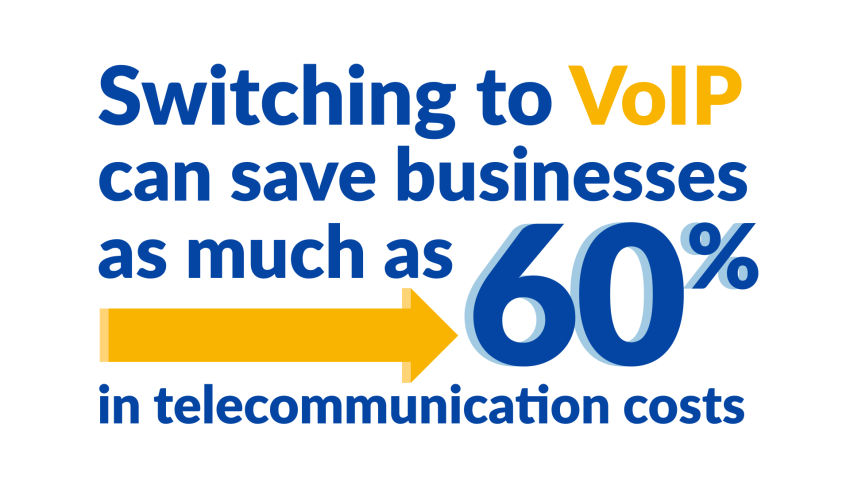
3. It’s a unified communications platform
Unified communication platforms let you communicate both internally and externally with a single tool.
With one, various teams — such as sales or customer support — can base their entire strategies around their hosted VoIP solution.
The right hosted unified communications solution offers several features like SMS and email, alongside the ability to make calls. You can instant message team members, host video conferences, and call your customers through the same hosted phone system.
4. Flexibility for remote teams
Do you have a remote team? Whether on an overseas business trip or working from home, you can accept calls with your hosted phone system. You don’t need to be in the office to pick up your wired desk phone.
That’s because most hosted phone system providers offer software for their users. Your remote team can download their business phone software onto their devices.
The PBX provider just makes the connection and diverts incoming or outgoing calls to your device. Your callers won’t notice any difference, especially when your provider offers masked caller ID.
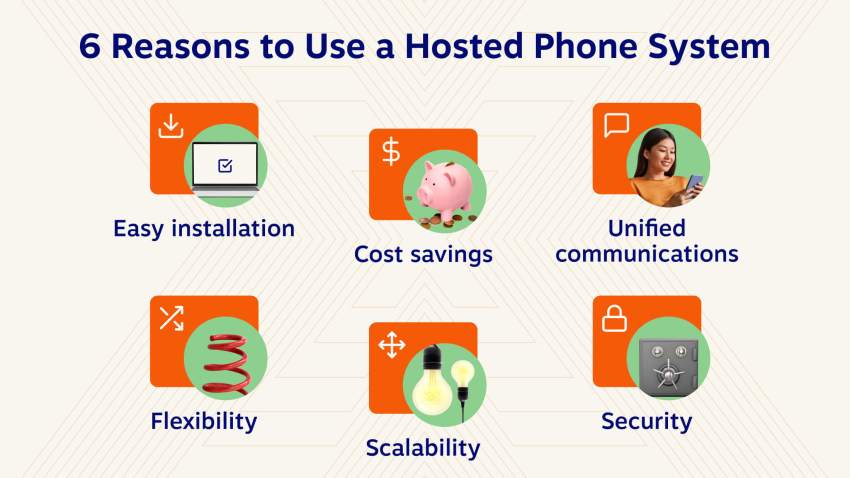
5. Better scalability
It’s important to have a phone system that grows with your business. Having a call-out from your traditional phone system whenever you add a new team member isn’t just frustrating; it’s also expensive.
One of the biggest advantages of having a hosted phone system is scalability. Adding a new team member? Just sign in to your provider’s cloud platform and get them in.
6. It’s more secure
It’s no surprise that businesses are concerned about their phone system’s security; the average cost of a data breach is $3.92 million.
Social engineering is one of the most common types of data breaches. It happens when hackers imitate your phone provider and ask them to hand over information. They can use that data to take over your system.
However, hosted phone systems have extra protection against social engineering. The majority of reputable VoIP providers have strong identity management tools. You’ll never be tricked into handing over information to a hacker.
And there’s strong encryption to ensure hackers can never eavesdrop on business calls.
The Drawbacks of a Hosted Phone System
We know that a hosted phone system has many advantages. But when it comes to the downsides, the truth is that there aren’t many. Here are a few considerations to keep in mind:
1. Reliance on internet connectivity
Your call quality hinges on a strong and stable internet connection since hosted phone systems use VoIP technology. This is generally manageable in a traditional office setting with reliable internet service.
2. Bandwidth requirements for remote teams
Each team member needs a strong internet connection to ensure smooth calling. Business VoIP calls require a minimum of 100 kbps of upload and download bandwidth per line. To put that in perspective, high-quality calls for ten simultaneous users necessitate at least 1 Mbps of dedicated bandwidth.
3. Potential for downtime
Hosted systems rely on both your internal network and the provider’s telecommunications infrastructure having power, and downtimes can be an issue. Traditional PBX phone systems are often seen as more reliable when operated independently within a physical location. However, they require upfront equipment investment and ongoing maintenance and lack the scalability and advanced features offered by hosted solutions.
Fortunately, solutions are readily available with hosted VoIP phone systems.
Major broadband carriers offer business internet plans with gigabit speeds (1000 Mbps), which is sufficient for most small businesses. Additionally, Nielsen’s Law of Internet Bandwidth Speed suggests a consistent growth rate of 50% annually since 1983, making high-speed internet increasingly accessible.
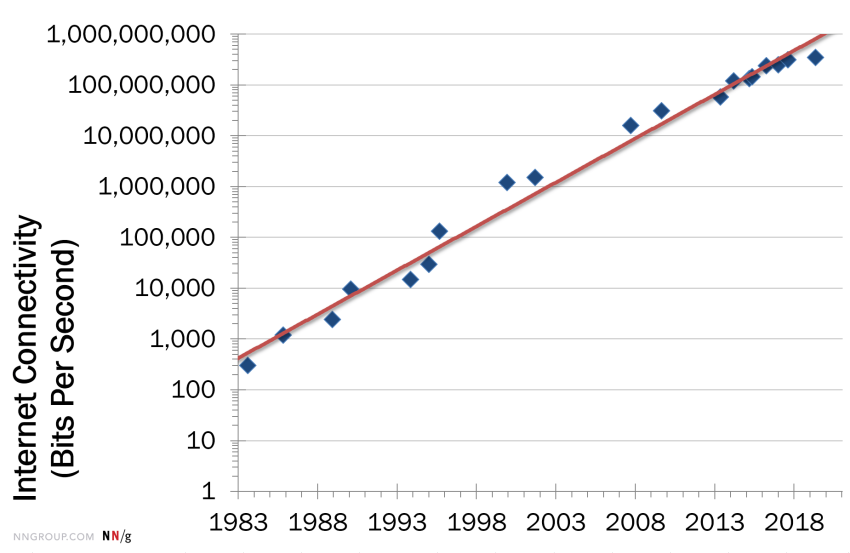
While a strong internet connection is crucial for hosted phone systems, the widespread availability of high-speed internet and the benefits of hosted systems often outweigh this potential drawback. Consider your business needs and weigh the trade-offs between the reliability of a traditional system and the scalability and features of a reliable business VoIP solution.
7 Hosted Phone System Features Your Team Needs
There are tons of hosted phone system providers to choose from. Not all of them offer the features your business needs.
Here are several advanced features to look for when you’re choosing a VoIP service provider:
1) Voicemail to email transcription
It should be no surprise that voicemail is a key feature your phone system should have. Without it, you risk people never calling back after you miss their call, potentially losing a customer.
However, finding time to get through those voicemails can be tricky. With this feature, your voicemail messages can be transcribed and sent directly to your inbox.
You don’t need to listen to the message to respond. Just listen to the voicemail transcription and have a permanent log of what the incoming call was about.
2) Video conferencing features
More workplaces are embracing remote work than ever. This means companies seek out hosted phone system providers that offer video conferencing as part of their packages.
Your virtual PBX can also serve as a conferencing tool for your team. There are no more add-ons for video conferencing like Google Meet, Skype, or Zoom! Just make sure to double-check that this feature is included in your chosen package.
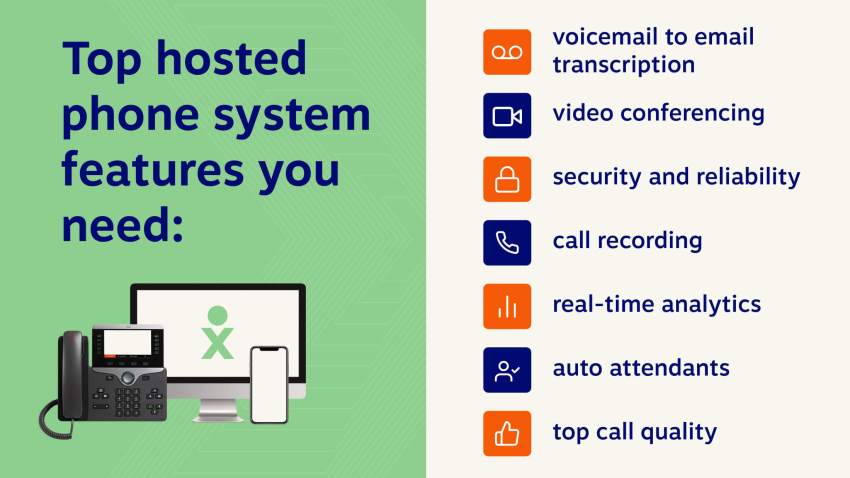
3) Security and reliability
The reliability of hosted phone systems is a cause for concern for many businesses new to cloud technology. But fear not: VoIP connections are just as (if not more) secure than traditional wired setups.
The key is to pick a secure VoIP provider, such as Nextiva. Our network has 99.999% uptime, and connections are made through carrier-grade data centers. In other words, it’s almost impossible for someone to hack the connection and eavesdrop on your phone calls.
4) Call recording
Call recording can help you monitor customer interactions for one-on-one progress reviews or training. For example, you might see that one sales rep has a lower close rate than others.
Use their call recordings to spot why that might be happening. You might find they fail to explain one of your brand messages, contributing to their poor close rate.
5) Real-time call analytics
Ask most businesses how effective their teams are, and they’ll struggle to find out. Traditional phone systems just match incoming calls to a desk phone — that’s it. No extra statistics are available.
However, some hosted phone systems offer real-time call analytics. This means you can report on how effective your teams are with actual data, such as:
- Inbound calls
- Total calls
- Answered calls
- Missed calls
- Toll-free calls
- Internal/external calls
- Talk time
- International calls
- Voicemail calls
- Calls in queue
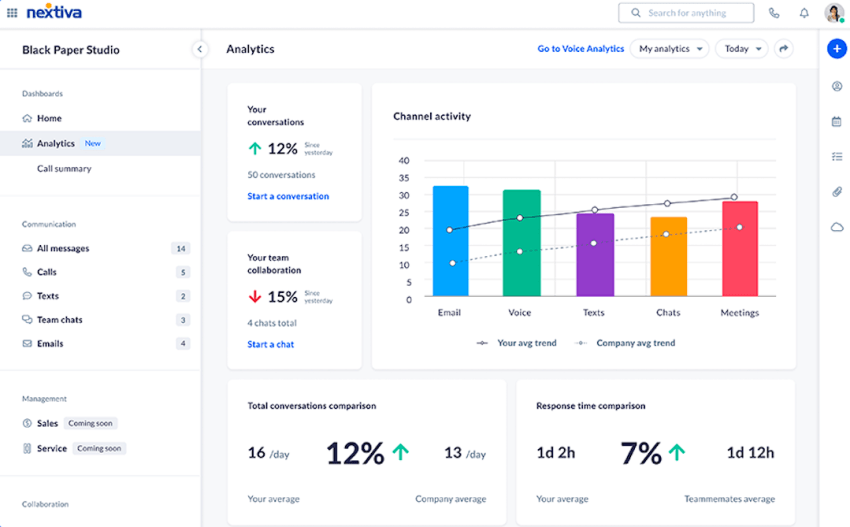
6) Auto attendants
If your hosted phone provider offers auto attendants, you don’t need a receptionist to screen and divert incoming calls.
This automated message asks what a caller needs help with and passes them to the most relevant person. Also known as an Interactive Voice Response (IVR), this call routing system saves time for everyone.
You can set up rules for the system online. So, if someone calls your business phone number and presses #2 for a customer support agent, you already have rules for which agent’s line will ring. (If you’ve got a call center, you can even opt for a group of agents’ lines to ring. The hosted phone system sends them to the next available agent.)
7) HD call quality
A common concern for businesses switching to a VoIP-based phone system is the call quality. They assume the quality will suffer because the connections aren’t wired (and internet connections can be unstable).
That isn’t true. In fact, hosted VoIP calls are much clearer than traditional phone lines.
You’ll need a decent internet connection that’s at least 100 Kbps, but most ISPs provide at least a hundred times that (10 Mb).
That means you’re likely already set up to make and receive high-quality calls through a virtual phone system, even if you’re making long-distance calls.

Choosing a Hosted Phone System Provider
Choosing the right hosted phone solution is crucial. Here are some key factors to consider:
- Scalability and flexibility: Ensure the system can grow with your business and allow you to add features as needed.
- Features offered: Select a provider with the most relevant features to your business needs. Don’t overpay for functionalities you won’t use.
- Reliability and uptime: Look for a provider with a proven track record of reliability and uptime guarantees. Your business communication system is critical — ensure it’s always available.
- Security measures: Choose a provider with robust security measures in place to protect your sensitive information.
- Customer support: Reliable and responsive customer support is essential for addressing any technical issues that may arise.
Ready To Switch To a Hosted Phone System?
There’s no doubt that a cloud-hosted phone system is the way forward. Long gone are the days of copper wires creating mazes around your office and tired technology that needs replacing every few months.
But remember to check that your new phone service provider offers the advanced features you need. That way, your business won’t need to deal with outdated, costly phone systems that take over the entire office.
Pricing for our cloud phone system (which includes all of those features) starts from just $15 per user per month.
Don’t miss out.
Hosted VoIP service done right
Integrate secure phone service, SMS, video, and team chat in VoIP platform.


















 VoIP
VoIP 













